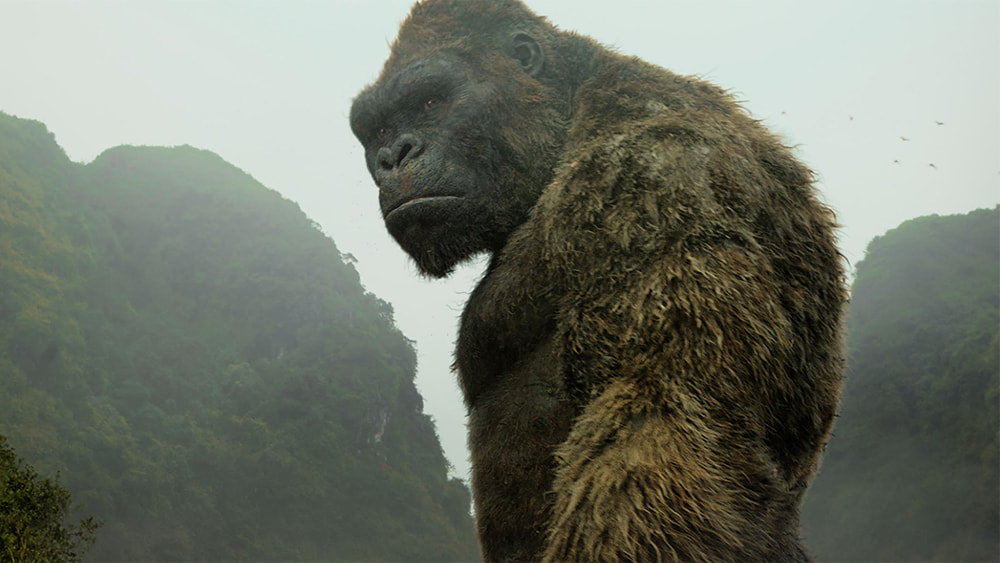With the team assembled, the journey to Skull Island can begin in earnest. Brooks, a seismologist with his own fringe theory of a hollow earth, gives the air cav geologic bombs to drop all over the previously undisturbed jungle. These bombs map the island, but they also arouse King Kong, who effortlessly bats the helicopters from the sky, killing many and scattering the rest. With the survivors reduced to trekking through a hostile jungle, they find solace with a tribe of natives, talked down from killing the intruders by Hank Marlow (John C. Reilly). Marlow's a WWII pilot who's been stuck on Skull Island since his fighter plane went down here, and in the intervening time, he's lost some of his sanity but gained knowledge about animals long thought to have been extinct. He explains that Kong serves as a benevolent dictator of the island, acting as a suppressive force to the voracious lizard-like beasts that live underground. However, Kong's the last of his kind, and for what he did to Packard's regiment, the colonel is dead-set on ensuring no more giant apes walk the earth.
Vogt-Roberts is making a film about a giant ape who punches other giant creatures, but his allusions to the Vietnam War brings the tiniest amount of weight to the proceedings. Packard is the apogee of this, as the war is recapitulated in his arc alone. Superior technology matters little in the face of an enemy on his home field. Packard is a monument to the Sunk Cost Fallacy, where every resource or life spent in pursuit of a nebulous goal means retreat or reevaluation falls further behind in the rearview. Even confronted with expert opinion and the impossibility of a win, Packard charges ever forward, desperate to make his losses mean something against what he intrinsically knows is an unworthy cause. Kong: Skull Island is not a film for the head, fun though it may be, but the parallels to historical events are the chewiest parts.
What's left is Vogt-Roberts' references to specific films and his aping (heh, heh) of and derision towards a specific action-film tone. For every nod towards Apocalypse Now (helicopter squadrons, naming Hiddleston's character Conrad), there's an undercutting of some trope from Stallone's or Schwarzenegger's heyday. As the score swells over what looks like a noble sacrifice, Vogt-Roberts steals the moment from the character, making their contributions wholly negligible. That most hoary of action film cliches, the snappy one-liner, is repeatedly trod underfoot, with characters cut off mid-sentence as they're stomped by an ape or gobbled by a dinosaur. Nature in all its ferocity isn't about to wait for some hyper-masculine thought to be finished. Some of the actors are wise to this, and some are not. Larson, Hiddleston, and Goodman are mostly playing everything straight, and in turn generate no laughs or emotion of any kind. They think they're in a cool 80's movie, if such a thing exists, while Jackson and especially Reilly know exactly what kind of film they're in. Jackson chews up the scenery as he does so well, and Reilly is the only character to find the humor and camp in this film that is, again, about a giant ape punching giant dinosaurs in the face.
With that giant monster action, Vogt-Roberts, whose previous and sole feature was indie gem Kings of Summer, proves that he's capable of steering these kinds of tentpole releases. Unlike Godzilla, which captured most of its action in error-hiding darkness, Vogt-Roberts captures Kong fighting in brightly-lit valleys with a clear sense of geography and spacing. Kong himself isn't quite as memorable as Peter Jackson's motion-captured version, but he still has a personality and an unhealthy interest in Larson's character. Like Jackson's entry, giant bugs play a role, and Vogt-Roberts does top Jackson in this arena, with a particularly inventive and gruesome death for one hapless soldier as a result of a skyscraper-sized spider. Lastly, if the Monster-verse franchise is going to be known for anything, it will hopefully continue in its trend of including at least one Mortal Kombat-style fatality amongst huge CGI creations.
Kong: Skull Island has enough dumb fun to make it rewatchable and enough of a sense of place to elevate it above disposability. It needs to strike some of the noble savagery that the film cursorily indulges in, as well as improve on the blandness at the top of the cast list because this is the most forgettable Brie Larson has ever been onscreen. Otherwise, Kong: Skull Island justifies more monster movies, if it serves as the template to be imitated and further improved on. B-

 RSS Feed
RSS Feed